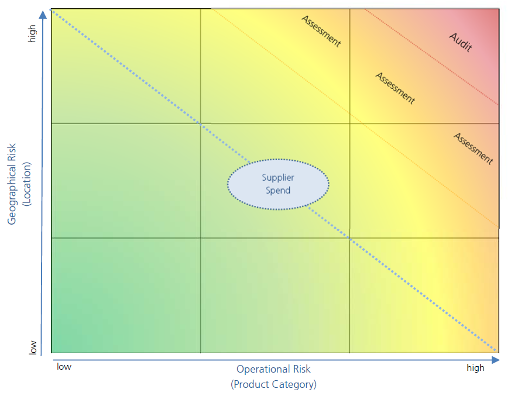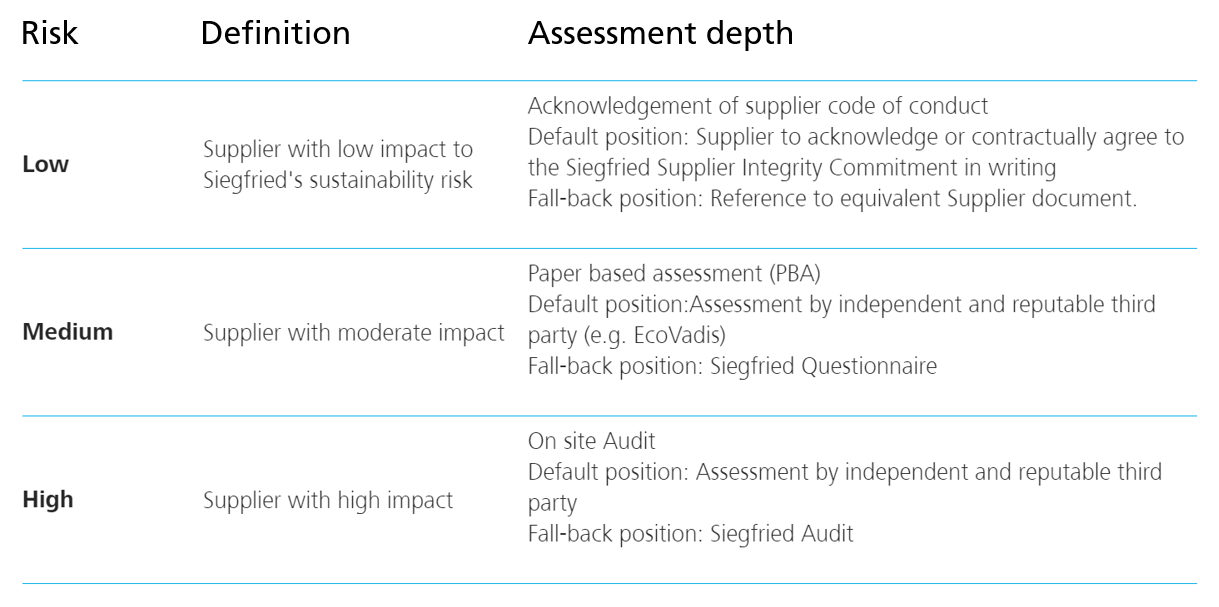Supplier sustainability risk assessment
Integrity and sustainability are key elements of Siegfried’s corporate values and they are integrated into our daily work. Just as we hold ourselves to the highest standards, we expect the same commitment from all parties in our supply chain (Suppliers).
Sustainability risk assessment regulation
In order to assess the Supplier sustainability risk with a focus on human rights, including all relevant issues related to child labor and conflict minerals (Sustainability Risk), Siegfried has established a dedicated Supplier Sustainability Risk Assessment Regulation (Regulation).
Sustainability risk mapping
According to the Regulation, Siegfried assesses all Suppliers in terms of (i) operational Sustainability Risk (product class) and (ii) geographical Sustainability Risk (geographical location of the goods/services rendered to Siegfried). Both dimensions are assigned to a specific Sustainability Risk level (low, medium or high) and visualized in a dedicated Supplier Sustainability Risk heat map from which Siegfried derives the recommended depth of Sustainability Supplier due diligence (Due Diligence). In addition to the operational and geographical Sustainability Risk, Siegfried takes into account the financial impact of a business relationship with a Supplier. In contrast to the operational and geographical Sustainability Risk, the financial impact of the business relationship with the Supplier is not used to assign a specific Sustainability Risk Profile to a Supplier. Rather, when faced with similar Supplier Sustainability Risk Profiles, the financial impact helps Siegfried to prioritize Due Diligence activities on those Suppliers where Siegfried has the greatest leverage due to the commercial significance of the underlying business relationship.
In FY2024, the total number of significant Tier 1 suppliers was 562. Significant suppliers are defined as those having higher risks of potential negative ESG impacts, significant business relevance to the company, or a combination of both.

Supplier sustainability due diligence
As a general rule, Siegfried endeavors to include the Supplier Integrity Commitment in all contractual agreements with Suppliers, whenever possible. With regard to the depth and scope of the Due Diligence, the Sustainability Risk will determine the required actions as detailed in the diagram.
Risk-based sustainability assessments

All Supplier responses are subject to a joint expert review by the Siegfried Sustainability Board work stream leaders (SMEs). The SMEs confirm whether (i) the collaboration with a Supplier can be initiated without further remediation action, (ii) additional Risk assessment or mitigation and correction activities will be required or (iii) the collaboration must be rejected or terminated. If Siegfried believes or has reason to believe that the information provided by a Supplier or a third party (i) does not accurately reflect the Sustainability Risk, (ii) the Sustainability Risk has materially changed since the last assessment, or (iii) a Supplier may be in violation of applicable laws or regulations, Siegfried will trigger additional appropriate Sustainability Due Diligence activities and reserves the right to terminate a business relationship with a Supplier at any time.
Sustainability governance
Internal oversight of sustainability risk management.
Board of Directors
Holds the ultimate responsibility for the definition of the strategy, the governance and the risk management of the Siegfried Group. For more information about Siegfried’s Sustainability governance structure: Annual Report 2024, p. 112.
Internal audit
Provides independent assessment by evaluating whether the systems, processes, and controls in place are effectively identifying, managing, and mitigating sustainability risks in the supply chain.
Siegfried Sustainability Board
Accountable for the implementation of the supplier due diligence program, together with the sustainability SMES decides whether a supplier must be excluded based on sustainability performance. The Board ensures alignment with Siegfried’s values and regulatory obligations and validates key decisions or escalations when necessary.
Sustainability subject matter experts (SMEs)
Review and assess supplier-provided data, including self-assessment questionnaire responses and third-party ESG ratings. SMEs determine whether a supplier can proceed or requires mitigation measures. They play a key role in interpreting complex assessments and supporting risk-based decision-making.
Global procurement
Acts as the process owner for supplier onboarding and due diligence initiation. Procurement ensures that all suppliers complete registration, including formal acknowledgment of Siegfried’s Supplier Integrity Commitment, and the collection of other relevant ESG documentation e.g sustainability certificates.
Siegfried audit team
Responsible for conducting on-site CSR audits for suppliers classified as high-risk. The team documents findings and evaluates whether suppliers meet Siegfried’s sustainability expectations. They also engage in re-evaluation where corrective actions have been implemented.
On-site sustainability audits
Siegfried conducts on-site CSR audits as part of its supply chain due diligence efforts and risk mitigation strategy. To ensure high-quality CSR audits, the Siegfried audit team is trained by external experts in human rights auditing, with emphasis on topics such as child labor, forced labor, and ethical supply chain practices. The selection of suppliers for these audits is guided by a structured process that includes:
Sustainability audit criteria
- Governance: A joint decision-making process between Procurement, Audit, Integrity, and Global Sourcing teams establishes an annual CSR audit plan. The scope of these audits covers key compliance areas such as human rights, forced labor, and ethical standards.
- Risk-based selection: Suppliers are prioritized for audits based on Siegfried’s risk heat map as further explained above.
- Prioritization: Suppliers with high strategic relevance or spending volume are prioritized for audits due to their critical role in the production chain. The feasibility of conducting on-site audits and the supplier’s willingness to collaborate are also considered.
Supplier relationship management
To reinforce a culture of continuous improvement and collaboration, Siegfried has introduced supplier incentives as part of its sustainability risk management strategy.
Supplier incentives
Suppliers who demonstrate ongoing alignment with Siegfried’s sustainability standards, actively engage in corrective actions and transparently report progress, may benefit from enhanced partnership opportunities. These may include preferred supplier status, extended contract terms, or eligibility for future projects.
This approach not only encourages higher sustainability standards but also builds trust and stronger working relationships, which helps to create a more open and solution-oriented dialogue with suppliers. By linking tangible business opportunities to sustainability performance, Siegfried aims to foster stronger accountability and encourage long-term sustainability commitments throughout its supply chain.
To support these efforts, Siegfried uses a dedicated supplier management platform to facilitate supplier onboarding and engagement. As part of the registration process, suppliers are required to acknowledge Siegfried’s Supplier Integrity Commitment before any business relationship can be initiated. The platform also enables the structured collection of ESG-related information, such as sustainability certifications (e.g., EcoVadis), contributing to a more transparent and comprehensive view of supplier performance and supporting ongoing collaboration.